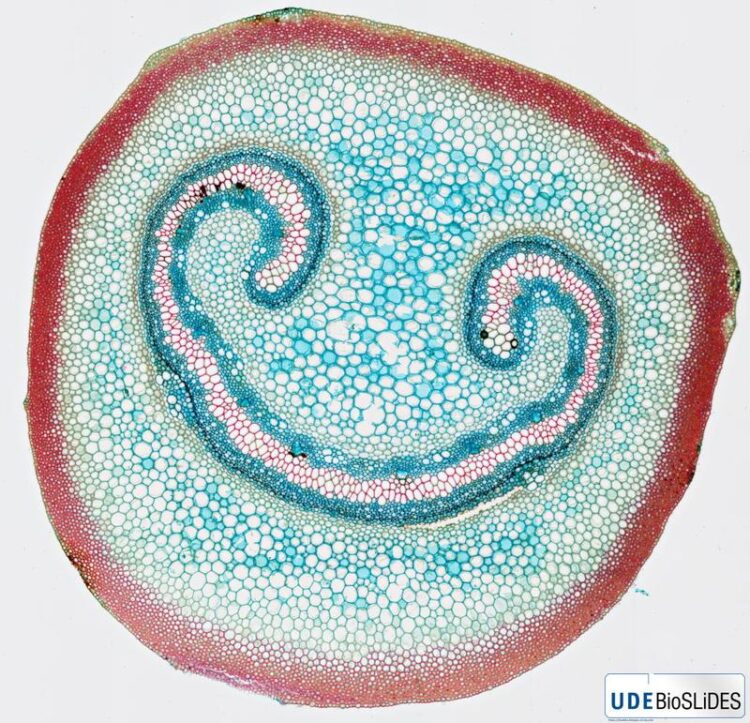Online Microscopy Platform: See-through for Everyone!

Cross section through the petiole of a royal fern in 20x magnification. The diameter is about 3 mm.
https://bioslides.biologie.uni-due.de
Fix the slide, adjust, start with the lowest magnification and then focus through the specimen: This routine is particularly familiar to biology students from microscopy classes. Now, the process also works digitally. More than 200 specimens of plants, animals and microorganisms can be viewed in detail online – without a microscope, free of charge and accessible to everyone. A biologist at the University of Duisburg-Essen (UDE) is making this possible with his project UDE BioSLiDES.
“During the pandemic, we were looking for a way to conduct our faculty’s microscopy courses online. The experience we gained was the starting point for UDE BioSLiDES,” says Dr. Michael Kloster from the UDE Phycology (Algae Science) working group, who is responsible for the project.
Water flea, strawberry mint, diatoms, flat-leaved vanilla: Almost 80 species can currently be found in the unique platform for virtual digital microscopy, with more to follow. One can focus through the high-resolution specimens just like on a microscope, in order to see details in sharp focus that are located in different layers. Additional information about the specimens provides biological background. Downloading is also no problem, as UDE BioSLiDES makes its digital preparations available as an Open Educational Resource – a total of over 800 GB of image data. Access as well as further use is free of charge. “The fact that there are so many specimens in the database that can be handled in a realistic way and are free to use is, to the best of our knowledge, unique in the world,” explains the biologist.
The service, which has just been launched, is intended for education at schools and universities worldwide, with all its contents available in both German and English. Anyone twelve years of age or older can access information about the selected organism, its anatomy, and the preparation and the microscope optics used. It all works right in the browser, without the need for an app or an add-on program.
Editor: Birte Vierjahn, +49 203/37 9-2427, birte.vierjahn@uni-due.de
Wissenschaftliche Ansprechpartner:
Dr. Michael Kloster, Fakultät für Biologie / Phykologie, +49 201/183-4513, michael.kloster@uni-due.de
Originalpublikation:
https://www.biuz.de/index.php/biuz/article/view/6410/5778
Weitere Informationen:
Media Contact
All latest news from the category: Life Sciences and Chemistry
Articles and reports from the Life Sciences and chemistry area deal with applied and basic research into modern biology, chemistry and human medicine.
Valuable information can be found on a range of life sciences fields including bacteriology, biochemistry, bionics, bioinformatics, biophysics, biotechnology, genetics, geobotany, human biology, marine biology, microbiology, molecular biology, cellular biology, zoology, bioinorganic chemistry, microchemistry and environmental chemistry.
Newest articles

Detector for continuously monitoring toxic gases
The material could be made as a thin coating to analyze air quality in industrial or home settings over time. Most systems used to detect toxic gases in industrial or…

On the way for an active agent against hepatitis E
In order to infect an organ, viruses need the help of the host cells. “An effective approach is therefore to identify targets in the host that can be manipulated by…

A second chance for new antibiotic agent
Significant attempts 20 years ago… The study focused on the protein peptide deformylase (PDF). Involved in protein maturation processes in cells, PDF is essential for the survival of bacteria. However,…





















